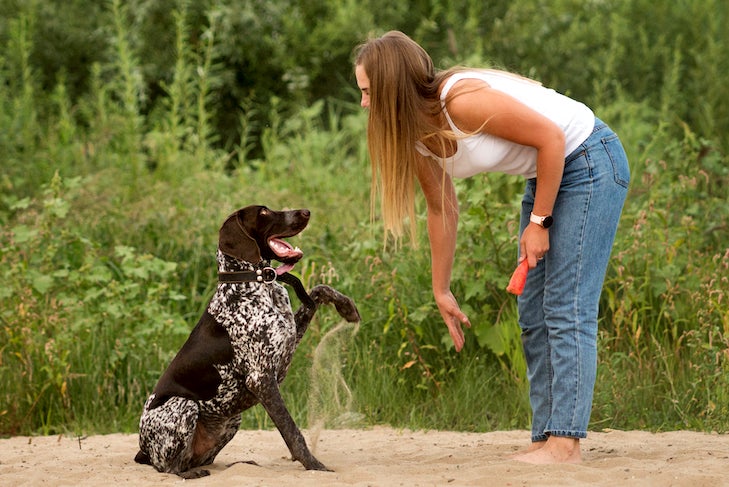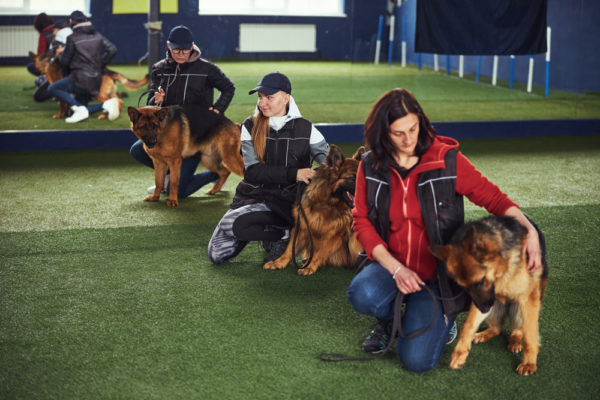Dog Training and Socialization: Key to a Well-Rounded Dog
Dog Training and Socialization: Key to a Well-Rounded Dog
Blog Article
The Ultimate Guide to Canine Training: Transform Your Pet's Habits
Effective pet training is essential for promoting an unified relationship between family pets and their owners. The ins and outs of canine habits and the implementation of structured training strategies play a vital role in this process. By understanding the concepts of favorable support, consistency, and socialization, animal proprietors can navigate usual challenges that arise throughout training. This guide not only aims to outfit you with the required devices to change your dog's behavior but also invites you to discover exactly how these foundational ideas can bring about a deeper link with your pet dog. What may be the very first step in this transformative journey?
Recognizing Canine Actions
Understanding canine actions is vital for efficient training and an unified relationship in between pets and their owners. A pet's behavior is influenced by a mix of genes, environment, and experiences. Dog training. Identifying these aspects permits owners to customize their training approaches to meet the individual requirements of their animals
Dogs connect mainly via body language, articulations, and faces. A wagging tail can show exhilaration or joy, while a put tail might indicate worry or entry. Observing these hints makes it possible for proprietors to respond appropriately, enhancing positive actions and resolving negative ones effectively.
Additionally, understanding the social framework of dogs can offer understandings right into their actions. Dogs are pack animals, and they prosper in a structured atmosphere. Establishing clear borders and constant guidelines can avoid complication and promote a complacency.
Furthermore, identifying the natural impulses of pet dogs, such as need to dig or go after, is critical. These instincts can be redirected with ideal outlets, such as play or exercise. By comprehensively recognizing these behavior aspects, proprietors can promote a positive training experience, eventually resulting in a loyal and well-adjusted canine companion.
Crucial Educating Methods
Efficient pet dog training relies upon a range of vital techniques that can considerably boost the discovering procedure for both the owner and the dog. One fundamental method is favorable reinforcement, which involves satisfying desirable behaviors with deals with, praise, or playtime. This approach motivates dogs to repeat the behaviors that result in positive outcomes, fostering a trusting partnership between the animal and proprietor.
An additional trick method is consistency in assumptions and commands. Using the very same verbal cues and hand signals helps the canine comprehend what is called for, lowering complication and promoting quicker understanding. In addition, establishing clear limits and regulations is important for effective communication.
Socialization is additionally an important element of training. Subjecting pets to various environments, individuals, and other pets assists them develop suitable social abilities and decreases anxiety in unknown scenarios.
Lastly, persistence and timing are crucial. Educating sessions ought to be brief however regular, making certain that the pet dog remains involved and responsive. By employing these vital methods, owners can develop a positive and organized training experience that promotes etiquette and reinforces the bond with their canine companions.
Creating a Training Arrange
Just how can a well-structured training routine boost a canine's knowing experience? A training schedule supplies uniformity, ensuring that pets obtain regular, focused direction. This predictability assists canines understand what is expected of them, reinforcing their learning and permitting for better retention of behaviors and commands.
When creating a training schedule, it is vital to take into consideration the pet's age, breed, and individual temperament. Youthful pups may benefit from much shorter, extra frequent sessions, while grown-up dogs may love longer, less constant training durations. Integrating a selection of activities can also maintain the sessions involving, protecting against monotony and advertising interest for discovering.
Additionally, organizing training sessions at details times of the day can assist strengthen find here a routine. Combining training with daily walks or play can create a positive organization with learning. It is also crucial to include time for reinforcement, such as treats or praise, to compensate desired actions without delay.
Finally, flexibility is key. While consistency is essential, being versatile to the dog's state of mind or power degree can improve their discovering experience. A well-crafted training timetable eventually lays the structure for efficient interaction and a more powerful bond in between the pet dog and owner.
Typical Training Difficulties
Despite having a top article well-structured training timetable, dog owners usually encounter various difficulties throughout the training procedure. One typical issue is incongruity in signs and commands. When several relative use various terms or tones, a canine might end up being baffled, hindering its ability to learn properly.
One more frequent challenge is interruption. Dog training. Dogs are naturally curious animals, and outside stimulations such as various other animals, sounds, or people can divert their interest during training sessions. This requires proprietors to develop a controlled environment or slowly present diversions to strengthen emphasis
Furthermore, varying energy degrees can affect training end results. High-energy canines might battle to work out down and concentrate, while more easygoing types may require added motivation to engage. Tailoring the training method to fit the individual canine's character is important for success.

Building a Solid Bond
A strong bond in between a canine and its owner is vital for successful training and overall well-being. Dog training. This connection cultivates trust fund, which is vital for reliable interaction throughout the training process. When a dog really feels secure and linked to its owner, it is more probable to react favorably to cues and commands
To develop this bond, uniformity is vital. Establishing a regimen that includes regular feeding, workout, and training sessions helps develop a sense of security. Additionally, positive reinforcement techniques, such as deals with, praise, and play, learn the facts here now strengthen wanted behaviors while reinforcing the psychological connection.
Socializing is an additional essential facet of bond-building. Revealing your pet dog to different environments, people, and various other animals helps them really feel much more positive and comfortable, boosting the bond with their owner. Engaging in activities together, such as walking, playing bring, or taking part in obedience training, promotes team effort and mutual satisfaction.
Conclusion

Understanding pet actions is essential for effective training and an unified relationship in between pet dogs and their proprietors.Effective pet training counts on a variety of vital methods that can significantly improve the discovering process for both the pet dog and the proprietor.Regardless of having a well-structured training schedule, dog owners typically encounter different challenges throughout the training procedure.In final thought, reliable pet dog training counts on a comprehensive understanding of canine actions, the application of crucial strategies, and the facility of an organized training routine. By emphasizing favorable reinforcement and uniformity, pet owners can dramatically improve their pets' behavior, ultimately making certain an unified partnership and advertising the wellness of both the pet dog and its atmosphere.
Report this page